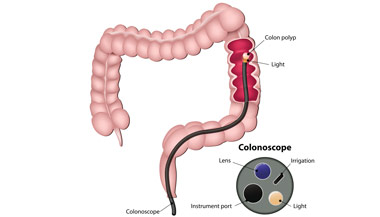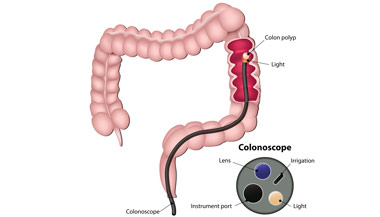Hereditary Colorectal Cancer
Hereditary colorectal cancer involves a cancer gene being passed from parent to child. However, it is unclear which gene causes the disease. If more than one family member has colon or rectal cancer, it could mean that the potential for developing this form of cancer has been passed from one generation to the next.
Hereditary Colorectal Cancer Symptoms
Many patients with colon or rectal cancer experience no symptoms in the early stages of the disease. Symptoms may not appear until the disease progresses to an advanced stage. Routine screening and understanding the risk factors are vital for protecting your health.
The symptoms of colon cancer and rectal cancer are similar to the symptoms of other colon diseases. If you experience the following symptoms, consult your physician for a proper diagnosis:
- Bloody stool
- Unexplained diarrhea
- A long period of constipation
- Abdominal cramps
- A decrease in size or caliber of stool
- Gas pain, bloating or a feeling of fullness
- Unexplained weight loss
- Lethargy and vomiting
Hereditary Colorectal Cancer Diagnosis
Genetic testing is available for certain hereditary colorectal conditions, including familial adenomatous polyposis, Lynch syndrome, APCI1307K and others.
Your medical team will compile a detailed medical history, including details from you and your family. The team will perform a physical examination and may order laboratory tests to diagnose your condition.
Other diagnostic procedures for hereditary colon and rectal cancers include the following:
Digital Rectal Exam
A digital rectal examination is a painless examination of your rectal area. During the exam, your doctor inserts a gloved, lubricated finger into the rectum to gently feel for any abnormalities.
Fecal Occult Blood Test
This test looks for occult (hidden) blood in the stool. A fecal occult blood test involves the following steps:
- You will receive three small cards. Place a sample from three consecutive bowel movements on each card.
- A small amount of the stool is placed on a special test strip.
- The stool is analyzed for traces of blood.
Flexible Sigmoidoscopy
A flexible sigmoidoscopy is used to examine the rectum and lower colon. Prior to a flexible sigmoidoscopy, your colon must be clear of stool to enable good visibility. Preparations may include a liquid diet, an enema and laxatives.
During the procedure:
- Your doctor inserts a sigmoidoscope (a thin, flexible tube) through the rectum and into the anus and large intestine to see if cancer or polyps are present.
- Biopsy forceps may be inserted through the scope to remove a small sample of tissue for further analysis.
- You may experience some cramping or discomfort.
Colonoscopy
A colonoscopy is the best way to detect polyps or cancer. It allows your doctor to see further into the bowel than a sigmoidoscopy to determine if polyps or cancer are present.
Prior to the procedure, your colon must be clear of stool to enable good visibility. Preparations may include a liquid diet, an enema and laxatives. You will most likely be sedated before the procedure.
A colonoscopy involves the following:
- Your doctor inserts a colonoscope through the rectum and into the anus and large intestine, checking to see if cancer or polyps are present.
- Biopsy forceps may be inserted through the scope to remove a small sample of tissue for further analysis.
- If there is a polyp, it can be removed through the colonoscope.
- The procedure may cause some cramping or discomfort.
Barium Enema
A barium enema (also called a lower GI series) is used to create an X-ray of the rectum and colon. Before the procedure, you will need to clear your colon of any stool. Preparations may include a liquid diet, an enema and laxatives.
During a barium enema:
- A barium preparation (contrast material) is inserted through a rectal tube.
- The barium outlines the colon, highlighting any abnormalities.
- An X-ray is taken.
- Your doctor checks the entire colon for polyps or cancer.
Hereditary Colorectal Cancer Treatment
Your doctor will recommend surgery to remove the cancer, alleviate your symptoms and offer you the best chance for a cure. There are different surgical options available.







